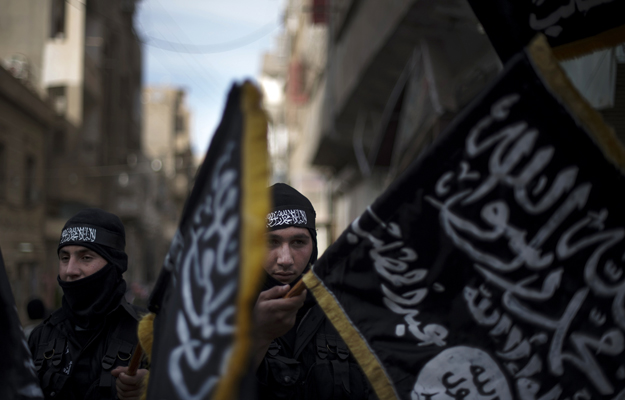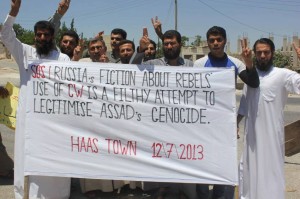LATEST: Video — Regime Bombardment of Krak des Chevaliers
PHOTO: Islamic State of Iraq fighters
In a further sign of the deadly fragmentation of the insurgency, the Islamic State of Iraq faction has killed a Free Syrian commander, according to an FSA spokesman.
Kamal Hamami, a member of the FSA’s Supreme Military Council, was meeting with ISI members in the port city of Latakia “to discuss battle plans” when he was slain.
“The Islamic State phoned me saying that they killed Abu Bassel and that they will kill all of the Supreme Military Council,” FSA Qassem Saadeddine said.
The incidents follows a series of clashes between the ISI — which has been increasingly prominent in northern Syria since early this year — and other groups in the insurgency. Earlier this month, the ISI took over the town of al-Dana, near the Turkish border, after a fight in which dozens of insurgents were reportedly killed.
Latest Updates, From Top to Bottom
Video: Regime Bombardment of Krak des Chevaliers
A tour of the damage of the 12th-century Krak des Chevaliers, the UNESCO-listed castle in western Syria, after regime shelling (see earlier video):
Video: Destruction in Damascus Suburb of Qaboun After Latest Regime Shelling
Insurgents Appeal for Foreign Help in Daraa Province
Deborah Amos of US National Public Radio speaks to insurgent commanders who appeal for more foreign support to withstand pressure from regime forces in Daraa Province in southern Syria:
“[The Americans] simply don’t trust us at the moment, and the problem is that we are now frustrated by the fact that we have no guaranteed source of ammunition,” [commander Mohammed al-Dehni] says.
Many commanders say they are frustrated with the long vetting process by U.S. intelligence agents in Jordan, and a Saudi arms pipeline that is undependable. The military aid promised by President Obama in June has not arrived at all.
“We’re very disappointed with what’s happening,” says Ahmad Ne’meh, a former air force officer who now heads the rebel military council in Dera’a.
Ne’meh and other commanders say the U.S. and its allies have been assisting with training and intelligence sharing. Some nonlethal aid arrived two months ago.
“We did receive logistical support in terms of bulletproof vests, night vision goggles and security communication devices,” he says.
To get the nonlethal U.S. gear, rebel fighters have to prove they are not Islamists. Every battle must be documented for U.S. agents at an operations room in Jordan, Ne’meh says. Other commanders confirm the process.
A Friday Protest Message to Al Qa’eda and Russia
A group of protesters in Hass in Idlib Province reject any involvement of Al Qa’eda in the uprising:
"We will build a free Syria ourselves; we won't import it from Tora Bora" RT @KareemLailah: #Syria pic.twitter.com/3VqWZKLv5r
— BSyria (@BSyria) July 12, 2013
Other protesters in Hass express anger at Russia’s claim this week that insurgents used chemical weapons against Syrians:
Video: Regime Bombardment of Krak des Chevaliers
Footage of regime shells hitting Krak des Chevaliers, a 12th-century castle and UNESCO World Heritage Site, in western Syria:
Insurgent Cleric Denies Reports He Incited Sectarian Violence
An influential Islamist cleric and insurgent commander, Sheikh Anas Ayrout, denied on Friday earlier reports that he had incited sectarian violence against Alawites.
On Wednesday, Reuters reported that Ayrout had called on insurgents to focus the fight on President Bashar al-Assad’s Alawite heartland in order to create a “balance of terror” that could help tip the conflict in favor of the opposition.
Reuters cited Ayrout as saying that insurgents should “concentrate on their [Alawite] strongholds and on their dwellings and their infrastructure. If (Alawites) continue living as they’re doing in peace and safety while wedded to the regime they will not be affected. They will not think of abandoning Assad.”
In a statement issued via the Syrian National Coalition, Ayrout denied that he had ever made that statement.
“I deny all statements claiming that I’ve incited sectarian violence towards the Alawites. Furthermore, I reject all incitements of hatred or violence towards any one group or sect. I also want to reiterate my commitment to the principles of the Syrian Revolution, that justice and equality is for all Syrians,” Ayrout said.
The cleric added that “the only legitimate target are those who continuously commit humanitarian crimes against the Syrian people. Moreover, those who have committed crimes will be brought to justice.”
One Fifth of Schools Destroyed or Unusable; Education of 2.5 Million Children Jeopardized
A report by the Save The Children Aid agency claims that more than a fifth of Syria’s schools have been destroyed or made unusable by the ongoing crisis, jeopardizing the education of 2.5 million young people.
The report called for more humanitarian aid to be spent on schooling, saying the Syrian education sector had requested $45 million in January from the U.N. Syria Humanitarian Assistance Response Plan but had only received $9 million by June.
It also noted that of 3,600 violent incidents affecting children’s education – such as schools being shelled, teachers attacked and children recruited into armed groups – recorded worldwide last year, 70 percent occurred in Syria. An estimated 3,900 schools in Syria had been destroyed or put out of action by January 2013.
Save the Children Chief Executive Jasmine Whitbread said in a statement accompanying the report: “The classroom should be a place of safety and security, not battlegrounds where children suffer the most appalling crimes. Children who are targeted in this way will be paying the price for the rest of their lives.”
Catholic Friar: “Humanitarian Crisis Imminent” in Aleppo
The food shortage in Aleppo is reaching such a desperate state that “a humanitarian crisis is imminent,” according to a Catholic Friar in the city.
Speaking to Catholic organization Agenzia Fides, Friar Bernard, of the convent of San Francesco, said that “Famine is upon us. People are afraid, impoverished and cries. We focus on helping families and refugees. The Christian areas are in the middle between the area controlled by the army and the armed groups. The suffering of the civilian population is immense. The block of food is against all basic humanitarian law. People find it hard to even get bread.”
The ongoing civil war has meant Aleppo is effectively under a food blockade as supplies are prevented from entering the city. Friar Bernard warned, “In Aleppo, if the embargo continues, a humanitarian crisis is imminent.”
Media Mujahidin: Harakat Ahrar As-Sham Publish Branded Video Of Rocket Fire Near Morek, Hama
This video, uploaded near Morek in Hama (see map) on Thursday, shows insurgents firing rockets on the regime-controlled Hamamiyat checkpoint (Hamamiyat is just east of Kfar Zita).
What is interesting about this video is its presentation. While many groups and brigades create and upload videos to disseminate their activities and messages, this footage features not only the Harakat Ahrar As-Sham Al Islami logo but also music and a short animated introduction, to anchor the footage firmly as part of the group’s “brand”.
Video: Activists Provide Food Aid To Raqqa’s Needy
This footage, posted on Friday, shows a local food aid distribution center — the Bab Baghdad [Baghdad Gate] Center in Raqqa.
The center is named for the Baghdad Gate, a local landmark in Raqqa, part of the city’s ancient eastern wall.
FSA Spokesman: “Those Who Killed FSA Leader Need to be Held Accountable”
The FSA’s Supreme Military Council will meet today to discuss the killing of one of its members, Kalal Hamami, by the Islamic State of Iraq faction.
FSA spokesman, Louay al-Mokdad, declared “We must take the necessary measures on all levels, and the Islamic State of Iraq and the Levant brigades should hand us over those who killed Hamami… so we can hold them accountable.”
He added, “Chief of Staff of the Supreme Military Council of the Free Syrian Army, Brigadier General Salim Idris, mourns our hero and martyr Mohammed Kamal al-Hamami, who was assassinated by the forces of evil.”
Syrian PM: “No Plans To Replace National Currency”
Syria’s Prime Minister, Dr. Wael al-Halqi said Thursday that the government does not intend to replace the Syrian national currency or nationalize the country’s private banks.
Al-Halqi’s remarks came after Syria’s currency hit a record low this week, plummeting to 310 pounds to the dollar on the first day of Ramadan. At the start of the crisis 28 months ago, the exchange rate was 47 pounds to the dollar. The currency drop has led to increasingly high prices, making it hard for Syrians to buy food.
Despite the drop, al-Halqi said that the Central Bank was in control of the situation and that its intervention this week had caused the dollar exchange rate to drop by SYP 50 within hours. Central Bank intervention would “continue so as to bring back the SYP exchange rate to acceptable levels” he added.
More Footage Of Khalid ibn al-Walid Mosque In Homs
On Thursday, EA posted a short video that shows the destruction of the historic Khalid ibn-al-Walid mosque in Homs following extensive shelling by regime forces.
This longer video, posted on Friday, shows more of the extent of the damage to this cultural and religious landmark, including to its interior:
Casualties
The Local Coordination Committees claim 55 people were killed on Thursday, including 21 in Damascus and its suburbs and 12 in Aleppo Province.
The Violations Documentation Center reports that 65,938 people have been slain since the start of the conflict in March 2011, an increase of 46 since Thursday. Of these, 50,336 were civilians, a rise of 27 from yesterday.
Video: Life Under a Collapsing Currency
Al Jazeera English reports on local traders and businesses in Aleppo amid an 80% fall in the value of the Syrian pound since the start of the conflict in March 2011:


